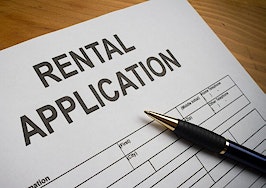It might seem obvious to some, but getting the right tenant is critical to a landlord’s ability to make steady, reliable, long term income. Whether a landlord succeeds or fails hinges directly on how stable his or her tenants are. But how do you ensure you find the right one?
Landlords often loathe the process of finding and vetting new tenants, and it’s easy to understand that perspective. It can be a long, frustrating process that isn’t necessarily guaranteed to net positive results.
Not finding the right tenant (often as a result of taking shortcuts in the vetting process) can be an expensive mistake. The worst-case scenario — an eviction — will cost landlords between $3,500-$10,000 according to TransUnion.
If you rent to someone who isn’t going to pay on time, causes damage to the property, or is a constant source of frustration to you, the dollars and time lost due to the hasty decision to rent to this person can add up quickly. Not to mention, if you have to evict and start the process all over again, you continue to lose money while the property sits vacant.
Once you have found great tenants – tenants who pay on time and report maintenance issues in a timely fashion – you want to keep them around. Most DIY landlords might assume that finding good tenants is little more than a game of chance and it’s just a matter of finding the right person. But there’s actually some science to it.
The ultimate guide to screening tenants for DIY landlords
Finding candidates
The process begins once your existing tenant notifies you they’ll be moving out. Do not wait to start looking for the next tenant.
The good news is that it’s never been easier to amass a pool of potential candidates for your vacant properties. It’s pretty easy to fill your funnel from a number of channels including Facebook, Craigslist, Zillow and others.
First, create a rental criteria list. You can even share a version of the list with potential tenants prior to showing the property to clearly outline your minimum requirements.
Next, get them on the phone and ask a few questions to make sure you don’t waste their time and they don’t waste yours. A phone call allows you to draw more information out of the prospective tenant than if you simply email them. These questions should explore your basic rental requirements as outlined below.
A few topics you might want to explore are:
-
Their current living situation
-
When and why they are looking to move.
-
Their current employment and income.
-
Your policies
-
Do they have pets?
-
Do they smoke?
-
Anything that you should know that could cause issues in the screening process?
-
Arranging viewings
Once you have confirmed interest from one (or more) of your candidates, the next step is to start scheduling showings. Quite understandably, a lot of landlords will want to keep vacancy periods short by showing the apartment whilst the current tenant is still in residence.
Ideally, however, you want to wait for your prior tenant to move out to avoid potential issues. For example, you might arrange for the next tenant to come see the property, only to have the current tenant decide not to move out. Or perhaps the existing tenants are messy (to put it nicely), and you know that no one is going to want to move into that mess.
The most important thing to remember is that even after you have shown the property to a number of potential candidates, do not stop looking for tenants until someone signs the lease and you’ve collected a deposit. Circumstances can change fast, and if for any reason a prospective tenant backs out at the very last minute you do not want to be going all the way back to square one. This could mean weeks of extra work.
Viewings are an opportunity for potential tenants to see the property, but also your opportunity to meet them in person to get a better understanding of who they are. When arranging viewings consider the following:
-
How enthusiastic are they?
-
Talk to them about their jobs. How stable is their employment?
-
Outline the terms of the lease
-
Do any of the red flags discussed above appear?
Do your due diligence
If they pass your screening, and application process the next step is to corroborate their stories. Don’t just take everything they say at face value. You can learn a lot quite easily just by doing a few online searches. You should also absolutely check references and contact their previous landlords to get a better sense of what kind of tenant they’ve been in the past.
Lastly, be sure to run a tenant screening report from a trusted service provider. When screening tenants it’s important — as with every aspect of being a landlord — that you are in full compliance with the law. There are a number of online resources that can tell you what questions and information are ok to inquire about and which are not. Be sure to note the difference in those laws from state to state as well.
Collect rent online
Once you’ve got great tenants you will want to keep them. The leading cause of evictions in the US is missed and late rent payments. As such, it’s important to have systems and processes in place to make paying rent as easy as possible for your tenants.
This means moving away from outdated processes like cash and checks and adopting an online rent collection system. The best software will enable your tenants to set up automatic payments, removing the possibility of late payments and even automatically track your income for you.
The time and energy are worth it
Screening candidates to ensure you get a reliable tenant that isn’t going to cause you headaches can be a time-intensive process, but trust me it’s worth it to go through all these steps.
Run your property as a business and respect your tenants as cherished customers and they are more likely to want to stick around. Remember the most important question is always: are they able and willing to pay the rent, in full and on time, every month?
Logan Ransley is co-founder of Landlord Studio. Follow him on LinkedIn.













